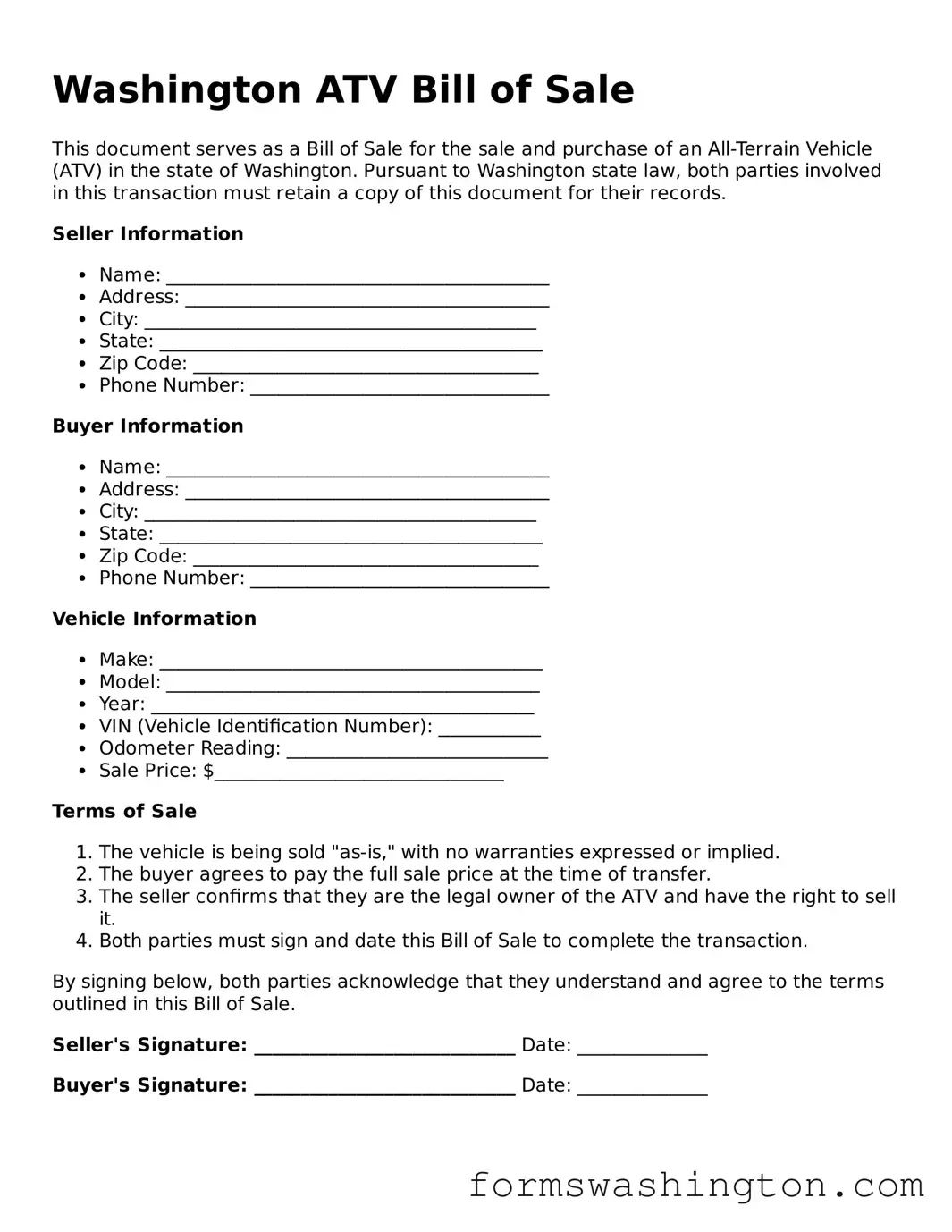Blank ATV Bill of Sale Template for Washington State
When buying or selling an all-terrain vehicle (ATV) in Washington State, the ATV Bill of Sale form plays a crucial role in ensuring a smooth and legal transaction. This document serves as proof of the sale and includes essential information about both the buyer and seller, such as their names, addresses, and contact details. It also specifies the details of the ATV being sold, including its make, model, year, Vehicle Identification Number (VIN), and any relevant condition notes. Notably, the form may include the sale price and any terms of the sale, such as whether the vehicle is sold "as-is." Completing this form not only protects the interests of both parties but also helps in the registration process with the Washington Department of Licensing. Having a properly filled-out ATV Bill of Sale can prevent future disputes and provides a clear record of ownership transfer, making it a vital component of any ATV transaction in the state.
Documents used along the form
When buying or selling an ATV in Washington, it's essential to have the right documentation to ensure a smooth transaction. The ATV Bill of Sale is a crucial document, but several other forms and documents often accompany it. These documents help clarify ownership, protect both parties, and comply with state regulations.
- Title Transfer Form: This form is necessary to officially transfer ownership of the ATV from the seller to the buyer. It includes details about the vehicle and must be submitted to the Department of Licensing.
- Vehicle Registration: After purchasing an ATV, the new owner must register it with the state. This document provides proof of ownership and allows the vehicle to be legally operated on public land.
- Affidavit of Ownership: If the seller cannot provide a title, this sworn statement can serve as proof of ownership. It includes the seller's declaration and details about the ATV.
- Release of Liability: This document protects the seller from future claims related to the ATV after the sale. It confirms that the seller is no longer responsible for any incidents involving the vehicle.
- VIN Verification: Some buyers may request a Vehicle Identification Number (VIN) verification to ensure the ATV is not stolen and matches the details provided in the sale.
- Sales Tax Exemption Certificate: If applicable, this certificate allows the buyer to claim an exemption from sales tax, typically for certain types of transactions or buyers.
- Insurance Policy: Buyers should secure insurance for their ATV before hitting the trails. Proof of insurance may be required for registration and provides peace of mind.
- Inspection Report: An inspection report can help verify the condition of the ATV before purchase. This document details any existing issues and can be beneficial for negotiations.
Having these documents on hand can make the buying or selling process much easier. They help to establish clear ownership and protect both parties in the transaction. Always ensure that all forms are filled out correctly and kept on file for future reference.
Misconceptions
Many people have misunderstandings about the Washington ATV Bill of Sale form. Here are six common misconceptions and clarifications to help clear up any confusion.
- Misconception 1: The Bill of Sale is not necessary for all ATV transactions.
- Misconception 2: A verbal agreement is enough to sell an ATV.
- Misconception 3: The Bill of Sale must be notarized.
- Misconception 4: The form is only for private sales.
- Misconception 5: The seller is responsible for all taxes related to the sale.
- Misconception 6: Once the Bill of Sale is signed, the seller has no further responsibilities.
In Washington, a Bill of Sale is essential for transferring ownership of an ATV. It serves as proof of the transaction and is required for registration purposes.
While a verbal agreement can indicate intent, it is not legally binding. A written Bill of Sale provides clear documentation of the sale and protects both the buyer and seller.
Notarization is not a requirement for the Washington ATV Bill of Sale. However, having it notarized can add an extra layer of security and authenticity.
The Bill of Sale can be used for both private sales and transactions through dealerships. It is a versatile document that applies to various selling situations.
In Washington, the buyer is typically responsible for paying the sales tax on the purchase of the ATV. The seller should inform the buyer of this obligation.
While the Bill of Sale signifies the transfer of ownership, the seller should ensure that the ATV is free of liens and that all disclosures are made. Failure to do so could lead to legal issues.
Check out Some Other Templates for Washington
Washington Prenuptial Contract - Important for ensuring both spouses feel equal in financial decision-making.
Homeschool Washington - This form can help avoid misunderstandings with local educational authorities.
Dos and Don'ts
When filling out the Washington ATV Bill of Sale form, it's crucial to ensure accuracy and compliance with state requirements. Here are some essential dos and don'ts to consider:
- Do provide complete and accurate information about the ATV, including make, model, year, and VIN.
- Do include the full names and addresses of both the buyer and seller.
- Do specify the sale price clearly to avoid any disputes later.
- Do sign and date the document to validate the sale.
- Don't leave any fields blank; incomplete forms may lead to issues during registration.
- Don't use outdated forms; always use the latest version of the Bill of Sale.
- Don't forget to keep a copy of the signed Bill of Sale for your records.
